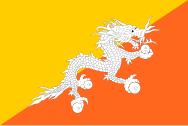Bhutan: Difference between revisions
m (Text replacement - "__TOC__" to "") |
No edit summary |
||
| Line 17: | Line 17: | ||
}} | }} | ||
{{abr-50|Oct, 2024}} | {{abr-50|Oct, 2024}} | ||
'''Bhutan''' officially the '''Kingdom of Bhutan''', is a landlocked country in South Asia situated in the Eastern Himalayas between China in the north and India in the south. With a population of over 727,145 and a territory of 38,394 square kilometers (14,824 sq mi), Bhutan ranks 133rd in land area and 160th in population. Bhutan is a constitutional monarchy with a king (Druk Gyalpo) as the head of state and a prime minister as the head of government. The Je Khenpo is the head of the state religion, Vajrayana Buddhism. | '''Bhutan''' officially the '''Kingdom of Bhutan''', is a landlocked country in South Asia situated in the Eastern Himalayas between China in the north and India in the south. With a population of over 727,145 and a territory of 38,394 square kilometers (14,824 sq mi), Bhutan ranks 133rd in land area and 160th in population. Bhutan is a constitutional monarchy with a king (Druk Gyalpo) as the head of state and a prime minister as the head of government. The Je Khenpo is the head of the state religion, Vajrayana Buddhism. | ||
Latest revision as of 20:36, 3 November 2024
| Kingdom of Bhutan |
|
(and Bhutan's largest city) |
Source information is available at [ Sources ] |
Bhutan officially the Kingdom of Bhutan, is a landlocked country in South Asia situated in the Eastern Himalayas between China in the north and India in the south. With a population of over 727,145 and a territory of 38,394 square kilometers (14,824 sq mi), Bhutan ranks 133rd in land area and 160th in population. Bhutan is a constitutional monarchy with a king (Druk Gyalpo) as the head of state and a prime minister as the head of government. The Je Khenpo is the head of the state religion, Vajrayana Buddhism.
The subalpine Himalayan mountains in the north rise from the country's lush subtropical plains in the south. The Bhutanese Himalayas has more than twenty peaks higher than 7,000 meters (23,000 ft) above sea level. Gangkhar Puensum is Bhutan's highest peak and the highest unclimbed mountain in the world. Bhutan's wildlife is notable for its diversity, including the Himalayan takin and golden langur. The capital and largest city is Thimphu, which holds close to 15% of the population.
Bhutan and neighboring Tibet experienced the spread of Buddhism, which originated in the Indian subcontinent during the lifetime of Gautama Buddha. In the first millennium, the Vajrayana school of Buddhism spread to Bhutan from the southern Pala Empire of Bengal. During the 16th century, Ngawang Namgyal unified the valleys of Bhutan into a single state. Namgyal defeated three Tibetan invasions, subjugated rival religious schools, codified the Tsa Yig legal system, and established a government of theocratic and civil administrators. Namgyal became the first Zhabdrung Rinpoche, and his successors acted as the spiritual leaders of Bhutan, like the Dalai Lama in Tibet. During the 17th century, Bhutan controlled large parts of northeast India, Sikkim, and Nepal; it also wielded significant influence in Cooch Behar State. Bhutan ceded the Bengal Duars to British India during the Bhutan War in the 19th century. The House of Wangchuck emerged as the monarchy and pursued closer ties with Britain in the subcontinent. In 1910, a treaty guaranteed British advice in foreign policy in exchange for internal autonomy in Bhutan. The arrangement continued under a new treaty with India in 1949 (signed at Darjeeling) in which both countries recognized each other's sovereignty. Bhutan joined the United Nations in 1971. It has since expanded relations with 55 countries. While dependent on the Indian military, Bhutan maintains its own military units.
The 2008 Constitution established a parliamentary government with an elected National Assembly and a National Council. Bhutan is a founding member of the South Asian Association for Regional Cooperation (SAARC). In 2020, Bhutan ranked third in South Asia after Sri Lanka and the Maldives in the Human Development Index and 21st on the Global Peace Index as the most peaceful country in South Asia as of 2024, as well as the only South Asian country in the list's first quartile. Bhutan is also a member of the Climate Vulnerable Forum, the Non-Aligned Movement, BIMSTEC, the IMF, the World Bank, UNESCO, and the World Health Organization (WHO). Bhutan ranked first in SAARC regarding economic freedom, ease of doing business, peace, and lack of corruption in 2016. Bhutan has one of the largest water reserves for hydropower in the world. Melting glaciers caused by climate change are a growing concern in Bhutan.
Spanking and Spanking Art in Bhutan
In the 20th century, school corporal punishment fell out of fashion and was gradually banned in many countries, a trend that continues until the present day.
As of May 2008, Bhutan permits corporal punishment in schools.
( We have no further information from SAOTK as of Oct, 2024 )
( We have no further information from Corpun.com as of Oct, 2024 )
Prostitution in Bhutan
- Prostitution in Bhutan ↗ on Wikipedia
External links
- More information is available at [ Wikipedia:Bhutan ]
Chat rooms • What links here • Copyright info • Contact information • Category:Root

